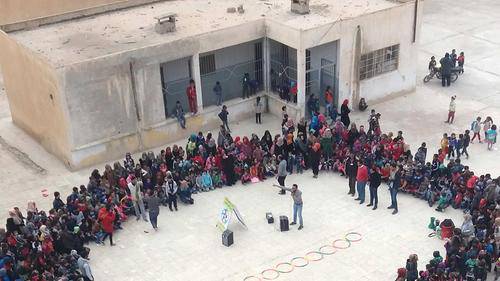
Centre that is deradicalising 15,000 Syrian children warns that the Islamic State is regaining ground
A children’s rehabilitation centre in northeastern Syria has warned of an ISIS revival unless the international community combats the militants’ deep-rooted ideologies imprinted on minors.
The group’s way of thinking will be hard to erase and may re-emerge especially as diplomatic efforts to end the war have faltered, paving the way for an ISIS resurgence, Together of Algarnya said.
“ISIS’s ideology still exists, although it has been defeated militarily, the threat it poses is evident in north-eastern Syria,” Mahmoud Al Mabrook, a Syrian civil society activist and manager of Together for Algarnya told The National.
The centre, which operates in the city of Raqqa, has hosted nearly 15,000 children since its launch in 2017. It aims to rehabilitate children back into normal society and give them the opportunity to enrol in primary or secondary schooling.
At the centre, children are taught about morality, peaceful co-existence and how to interact with one another. It also hosts reading, maths and psychological support programs.
But Mr Al Mabrook says the centre prioritises helping children who were born to one or both parents in ISIS.
“Since 2017 we received 603 children who were illiterate, 434 children who were innumerate, 995 children who needed psychosocial support. We have a mobile team that managed to enroll 13,393 children in to our programmes,” he said.
The mobile teams visit schools in the area to “support their educational system and to enable the children to perform recreational activities,” Mr Al Mabrook said.
Their ages vary from seven to 18.
“If we feel the child requires more time, then we would extend their program. Our main focus are on children who attended schools run by ISIS or whose families belonged to the group,” Mr Al Mabrook said.
It will take years of hard work to reverse the indoctrination that ISIS conducted on children living under its rule, he said.
“There are many families in north-eastern Syria that still accept ISIS over the regime. Many chant ‘ISIS not the regime’ and this is worrying. It will mean that ISIS could make a comeback one day,” Mr Al Mabrook said.
Civil activists who train children hope their programs would would turn them into “non-threatening citizens, who could one day re-join society.”
Although US President Donald Trump hailed a total defeat of ISIS this year, Syria’s civil activists see things differently. They say what remains of the terrorist group is here to stay.
ISIS has suffered significant setbacks over the past two years, losing most of its territorial control and has returned to its roots as an insurgent group.
It remains active despite the fact that it no longer operates as a proto-state.
US officials believe Al Hol camp, managed by Syria’s Kurdish allies with little aid or security, is evolving into a centre of ISIS ideology and a huge breeding ground for future terrorists.
Mr Al Mabrook warned that nearly 800 families with ISIS members have recently left Al Hol and returned to their area of origin.
“Each family has at least two or three children, they have not been enrolled in any of the rehabilitation programs,” he said.
There are several other civil society groups that operate around the city. The Enmaa Centre, located in Al Karama town, east of Raqqa, is currently housing about 70 children with special needs.
Since 2017 they have co-operated with schools around the city to raise the standard of education and enable a large number of children to enroll into schools, Ahmed Al Hashloum, director of Enmaa.
“We have a child centre that seeks to provide an educational environment that is friendly and safe for the children. We also provide psychological support through various activities such as painting, music and sports,” he said.
The centre also has a psychosocial support mobile team.
“We work to provide a safe and stable life to the children by giving them work and projects that ensures they achieve their full ambitions and talents,” Mr Hashloum said.
The group opened a community centre in March which promotes the principles of citizenship, reconciliation and civil peace and a culture of dialogue and the participation of citizens in decision-making, Mr Hashloum said.
However, like many aid groups operating in the area, the centre said it is running low on funds, especially as donations have been halted for the time being.
“We cannot operate without any capital,” he said, adding, “although we have volunteers it is still not enough.”
Source: The National





